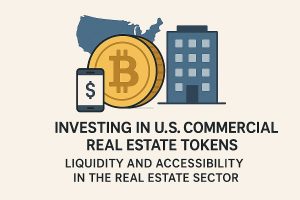The rise of Fintech startups has brought dramatic changes to many industries, including the mortgage loan market in the United States. These innovative companies leverage technology to offer enhanced services, which disrupt traditional financial landscapes.
Particularly in the mortgage sector, these advancements are reshaping how consumers access, apply for, and manage home loans. This article delves into the various ways these new players influence the mortgage loan market.
With the advent of technology, mortgage processes are becoming more streamlined and user-friendly. Fintech startups are at the forefront of this transformation, utilizing AI, big data, and blockchain to offer quicker and more efficient loan services. The impact is far-reaching, influencing everything from application approval times to interest rates and terms.
The Role of Innovation in the Mortgage Industry

Technological innovation in the mortgage market is accelerating rapidly, driven primarily by agile newcomers. Traditional banks and financial institutions are starting to feel the heat, as these smaller, tech-savvy competitors redefine customer expectations. Their primary edge lies in the ability to provide more personalized, transparent, and speedier services.
Historically, applying for a mortgage loan involved a lot of paperwork, time, and human interaction. Now, digital solutions allow potential homeowners to complete much of the process online. The innovation brought by these Fintech entities not only cuts down the time spent on applications but also reduces errors and increases efficiency.
AI and Big Data: The New Game Changers
Artificial Intelligence (AI) and Big Data analytics are transforming the mortgage market landscape. Utilizing these technologies, modern firms can process vast amounts of data at unprecedented speeds, offering insights that were previously unattainable. This capability is especially beneficial for credit scoring, risk assessment, and personalized loan terms.
By harnessing AI, computational systems can predict a borrower’s ability to repay a loan with greater accuracy. This reduces the chances of default and ensures that loans are offered to individuals who are genuinely capable of repaying them. Big Data complements this by providing a rich context for decision-making, drawing from myriad data points.
Blockchain Technology: Bringing Transparency and Security
Blockchain technology is another groundbreaking advancement introduced by Fintech in the housing finance industry. Known for its innate security features, it offers an immutable ledger system that ensures all transactions are transparent and tamper-proof. This development is proving invaluable in mortgage processing.
The decentralized nature of blockchain means that all parties involved in a mortgage transaction can access the same information, thus fostering transparency. It eliminates the need for intermediaries, reducing costs and speeding up processes. Furthermore, the inherent security of blockchain minimizes the risk of fraud, making the transaction process more secure.
Customer Experience: A Paradigm Shift
The impact of Fintech startups on customer experience in the mortgage sector is substantial. By emphasizing user-friendly interfaces and customer-centric services, these companies are setting new standards for what borrowers can expect. Mobile apps and online platforms facilitate easy access to mortgage services, providing borrowers with real-time updates and a seamless experience.
Fintech entities focus heavily on improving user experience by simplifying complex mortgage processes. They employ intuitive design and automation to minimize the time and effort required by consumers to obtain a home loan. Features like chatbots and 24/7 customer service provide continuous support to clients, addressing their queries promptly.
Furthermore, the transparency maintained by these companies helps build trust, as borrowers can monitor every step of their loan application. With more control over their mortgage journey, users are empowered to make better financial decisions.
Financial Inclusion and Accessibility
The advancements brought by digital mortgage firms are also making home loans more accessible to a broader demographic. By lowering entry barriers, these entities provide opportunities for individuals who might have found it challenging to qualify under traditional schemes. This includes younger, first-time homebuyers and those with less established credit histories.
By leveraging alternative data sources and sophisticated algorithms, these companies create a comprehensive view of a borrower’s financial health beyond the traditional credit score. As a result, they are able to offer mortgage options to a wider range of applicants, promoting financial inclusion.
This broader accessibility not only helps more people achieve the dream of homeownership but also drives competition in the mortgage market. Traditional lenders are compelled to innovate and improve, benefiting all consumers in the long run.
The Future Outlook
The influence of Fintech startups on the mortgage loan market continues to grow, and their future impact looks promising. With ongoing advancements in AI, blockchain, and data analytics, the expectation is that these firms will keep evolving, providing even more efficient and customer-friendly solutions.
We can anticipate more integration of these technologies into various stages of the mortgage process, further simplifying and enhancing the user experience. Additionally, collaborations between traditional banks and Fintech entities are likely to increase, leading to more hybrid models that combine the strengths of both.
Overall, the entry of these innovative companies has spurred a paradigm shift in the mortgage industry, pushing traditional players to rethink their strategies. As these changes unfold, consumers stand to benefit the most, enjoying a more streamlined, accessible, and customer-focused mortgage market.



